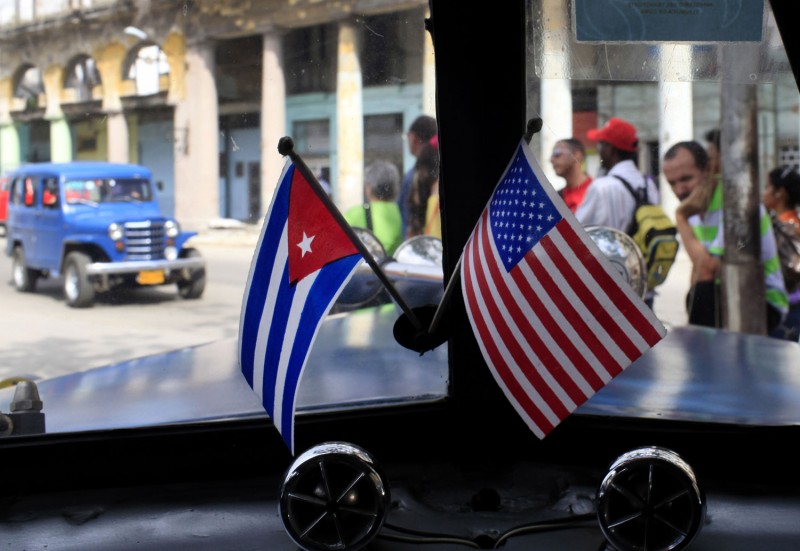
Cuba and the United States re-established their diplomatic relations on December 17. Image used with permission from the Letra Nueva blog.
On December 17, 2014, the governments of Cuba and the United States announced their intention to rebuild diplomatic ties, reestablish trade relations, and reopen lines of communication that have been all but frozen for over 50 years.
Cuban bloggers, citizen journalists, and social media users across the political spectrum, living both on the island and in the diaspora, have been debating the impact these measures will have on Cuba. These conversations are many times not reflected in mainstream media.
Global Voices authors have taken, and will continue to take, a close look at this conversation. We want to make sure that you – our readers – are listening to Cuban citizens.
- Netflix is Coming to Cuba — But Will They Have Any Customers?
- Castro and Obama Open New Chapter on US Cuba Relations
The U.S. Department of Treasury amended the Cuban Assets Control Regulation on January 16, 2015, to implement policy changes that facilitate authorized travel to Cuba by U.S. citizens, certain authorized commerce, and the flow of information to, from and within Cuba.
Meanwhile, experts on economic and trade policy from both sides of the Florida Straits have initiated a new series of conversations about US-Cuba relations as they relate to trade, immigration, and even human rights.
The news sent shock waves across the island. Some Cubans were overjoyed, while others were skeptical of the intentions behind the reform.
- ‘A Happy Day Has Come’ for Cuba and the US
- Cuban Dissidents Harbor Hope, Fear, and Fury Over US-Cuba Reconciliation
Cubans communities in the US, Spain, Germany, and Mexico also expressed a range of responses to the news.
Days after the announcement, Global Voices author Sandra Abd’Allah Alvarez Ramirez, who left Cuba for Germany in 2013, wrote:
In our home in Hanover, my partner Esmeralda and I experienced the gamut of emotions: anticipation, expectation, happiness, uncertainty, tears, euphoria.
Read Sandra’s story: I Have Never Known a Cuba That Wasn't Blockaded
Much of the impetus for this change in US-Cuba relations hinged on the release of Alan Gross, the USAID subcontractor who was jailed for bringing wireless technology to the island without permission in 2009. Technology has played a significant and controversial role in US-Cuba relations since the mid-2000s, and will unquestionably have a strong impact on their future.
- Cuba: More Money Means More Technology, With or Without State Reforms
- Spies Like US: “Fake Twitter” Violated Cubans’ Privacy Rights
- Could Cuba become the next Egypt?
- Cuba: US Contractor Sentenced to 15 Years in Prison
- Cuba: Cyberwar? Video Sparks Debate, Anger, Skepticism
Cuba has not only been central to Latin American politics, but also a beacon of solidarity among nations in the region. In recent years, Cuba and Venezuela, with Hugo Chavéz at the helm, had strengthened social and economic ties. The US-Cuba reconciliation has fueled questions on the future of these relationships.
- Where Does Venezuela Fit in the New US-Cuba Love-in?
- Cubans Mourn President Chávez's Death
- Chavez’ Legacy & How His Death Could Affect the Caribbean
Along with our friends and families in both countries, Global Voices authors have spent many years meditating on the effects of the embargo on the lives of Cuban families and imagining what life would be like if the policy were to change.
- The New York Times Joins Clamor to Change US Policy Toward Cuba
- What Would Happen If the Ban on U.S. Travel to Cuba Were Lifted?
- Extending bridges between Miami and Havana
- United States Embargo Breaks Into the Intimate Lives of Cubans
Additional Resources
Barack Obama and Raul Castro Statements delivered on December 17, 2014:
- President Obama’s Statement on Cuba
- President Raul Castro’s Statement
- Cuban President Raul Castro announced to Cuban people his willingness “to hold a respectful dialogue with the United States on the basis of sovereign equality, in order to deal reciprocally with a wide variety of topics without detriment to the national independence and self-determination of our people.”
Next Steps:
- Charting a New Course on Cuba – White House
- Statement by the Press Secretary on the Publication of Regulatory Changes regarding Cuba
Cuban Sanctions:
- Changes to the Cuba Sanctions – Frequently Asked Questions
- Related to Publishing Activities
- Publishing Activities Involving Manuscripts from Sanctioned Countries
- Publication Activities Performed by U.S. Newspapers
- Related to Travel Transactions
- Prepaid Tourist Packages are Prohibited
- Related to the Transfer of Claims Against Cuba:
- Notice Regarding the Transfer of Claims against Cuba Certified by the Foreign Claims Settlement Commission
Executive Orders, Statutes, Rules and Regulations Related to Cuba:
- 12854 Implementation of the Cuban Democracy Act (Effective Date – July 4, 1993)
- Cuban Democracy Act of 1992 (CDA), 22 U.S.C. §§ 6001-6010
- Cuban Liberty and Democratic Solidarity (Libertad) Act of 1996, 22 U.S.C. §§ 6021-6091
- Sections 5 and 16 of the Trading With the Enemy Act (TWEA), 50 U.S.C. App. §§ 5, 16
- Trade Sanctions Reform and Export Enhancement Act of 2000 (TSRA), 22 U.S.C. §§ 7201-7211
- 31 CFR Part 515 – Cuban Assets Control Regulations
Press Coverage:
This coverage was co-created by Firuzeh Shokooh Ville, our Spanish language editor, Ellery Roberts Biddle, our Advocacy editor and Elaine Diaz, our Cuba author.
